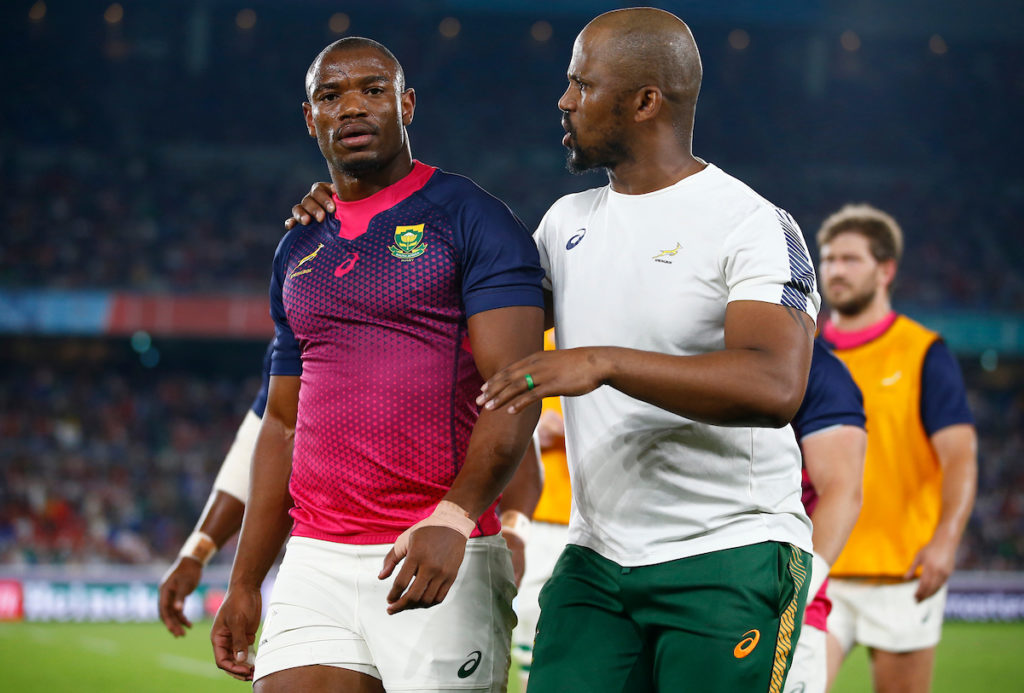Springbok assistant coach Mzwandile Stick says Makazole Mapimpi’s rugby story should serve as an inspiration to others, writes CRAIG LEWIS.
In the latest SA Rugby magazine, Mapimpi opened about his journey from the lower echelons of SA rugby to becoming the first Springbok to score a try in a World Cup final.
READ: What’s in our latest issue?
It’s a story of overcoming the odds, with Mapimpi detailing his challenging upbringing in the Eastern Cape, while explaining why he has been inspired to speak out against gender-based violence.
READ: Part 1 – Courage of a champion
Stick, who hails from the Eastern Cape and who has worked closely with Mapimpi, is someone who quickly warms to the subject when discussing the progression of the former Border player.
‘A lot of players have different story lines to tell, but the most unique thing about Makazole’s journey is how just a few years ago he was playing for the Border Bulldogs. But once he had the opportunity to play for the Kings in Super Rugby, he never looked back. When things are tough, only the best make it through.
‘I always try explain to people what it’s like in the rural areas; some kids have to walk more than 10kms just to go to school. Those are the challenges that are faced at a young age, but Makazole saw a way to improve his life and to make something of himself through rugby.
‘It’s an inspiration for other young kids to know that no matter how difficult things can be, if you’ve got goals and know what you want to achieve, it can be done. As soon as Makazole got his chance, he was ready for it and made the most of it.’
Since his breakthrough on to the Vodacom Super Rugby and international arena, Stick has proudly marvelled at Mapimpi’s determination to master his craft – evolving into a well-rounded, world-class wing. Moreover, the manner in which he has found his voice to address social injustices stands out beyond any on-field achievement.
‘As a human being, Makazole is extremely inspiring and a true role model, especially for those who come from the rural areas like him,’ Stick says. ‘Another example of this is how he had the opportunity to go play overseas, but he decided to stay in South Africa to keep achieving more.
‘If we talk about his experience, he has only played 14 Tests, and so there’s a lot more he can do. If you look at the next challenges, there is no doubt Makazole would want to play against the British & Irish Lions, and considering how well he looks after himself, I think there’s even a good chance he could make it to the next World Cup.
‘Mapimps is a true inspiration, and this has shone through as we’ve seen another side of him now where he’s fighting against gender-based violence and spreading the word about protecting our daughters, our sisters, our mothers – these are important subjects where someone like him can really make a difference through his platform.
‘In the position where we are, it’s important to not only make a difference just between the four lines on the field. The South African people come out to support us, and make sacrifices to do so, and we owe it to the country to give back and to also raise awareness about subjects like protecting our women.’
*This feature first appeared in the latest SA Rugby magazine, now on sale!
What sets Mapimpi apart?
‘Makazole is a very special player, and you realise that when you work with him,’ says Stick. ‘He was a late developer who only started playing Super Rugby in 2017, but three years later he’s won a World Cup. It shows that he is a very good student of the game, and even at his age he continues to learn. He is one of those players who everyone enjoys being around. When he first joined the squad he was a bit quiet, but once he gets comfortable with people around him, then you start seeing how it brings out the best in him. Of course he has a special bond with Lukhanyo Am, but it’s the same with him and someone like Willie le Roux, who plays an important role in the back three with him.’
The biggest improvements Mapimpi has made:
‘When you think about where he comes from in the Eastern Cape, and the rugby players down there, often the fundamentals of the game are not taught all that much, such as high-ball work because the focus is often more on the running game. That’s an area where Mapimpi has improved so much. I also know there are a lot of boys out in the Eastern Cape who may not enjoy the side of the game where you are making lots of tackles, but that’s an another aspect of his game that we worked on and invested time in. And the one thing about Mapimpi is that the moment he understands what is required of him, he will do everything in his power to execute that. In the past two years, I can proudly say he is one of the most improved players in South African rugby.’
Photo: Steve Haag/Gallo Images





